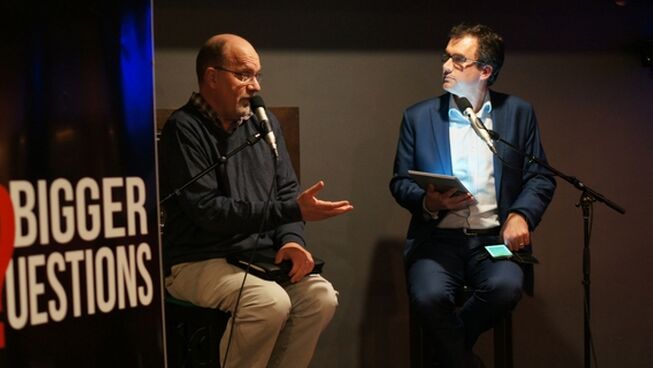
In 2010 in the Wall Street Journal, outspoken atheist comedian Ricky Gervais said,
“I don’t believe in God because there is absolutely no scientific evidence for his existence and from what I’ve heard the very definition is a logical impossibility in this known universe”
Is Ricky Gervais right, or is it logical to believe in God?
We ask Professor Greg Restall some Bigger Questions.
Greg is Professor of Philosophy at the University of Melbourne where he teaches philosophy and logic. He has published over 80 articles, is the author of four books, and blogs at consequently.org.
This episode was originally broadcast and released on 2nd April 2017, hence the absence of an episode number.
Invest in Bigger thinking for as little as US$1 per podcast on Patreon.
Bigger Questions asked in the conversation
You’re a logician, now apparently that’s different from a magician?
Smaller Questions
Today we’re talking with Greg Restall about if it is logical to believe in God. So Greg, our smaller questions to you today are: how well can you do logic problems?
Philosophy
So Greg, is teaching logic just giving your classes difficult logic problems?
What happens when you say you’re a philosopher at a party?
In 2011 famed physicist Stephen Hawking declared, philosophy is dead. Is philosophy important in everyday life at all?
Greg's story
Now your interest in philosophy actually began as a religious quest - can you tell us what happened? Tell us your story.
What was is about Jesus that convinced you to follow him?
Logic and God - is it logical to believe in God?
In the Wall Street Journal in 2010, outspoken atheist comedian Ricky Gervais said,
“I don’t believe in God because there is absolutely no scientific evidence for his existence and from what I’ve heard the very definition is a logical impossibility in this known universe”
Yet your personal experience would suggest otherwise. But is Ricky Gervais right, that God is by definition, a logical impossibility? Or is it logical to believe in God?
Some are not convinced by the philosophical arguments for God? Are they actually good arguments? (i.e. are the arguments actually logically sound?)
Some would object and say that we don’t even need logical reasons to believe - Logic isn’t important as long as you have faith? What do you say?
The Bible’s answer - Colossians 1
Today's Big Question is: Is it logical to believe in God? Perhaps surprisingly the Bible also offers an answer. In a letter found in the New Testament, written by the Apostle Paul to the early church in Colossae, which is in modern day Turkey, Paul says this about Jesus,
15 The Son is the image of the invisible God, the firstborn over all creation. 16 For in him all things were created: things in heaven and on earth, visible and invisible, whether thrones or powers or rulers or authorities; all things have been created through him and for him. 17 He is before all things, and in him all things hold together.
How does this help us answer the question of is it logical to believe in God?
So when Paul writes in Christ all things hold together - you see a logical nature in God and in his universe?
What is significant that it is in Jesus Christ, that ‘all things hold together’?
What difference does this make to you?
Is it significant, that you as a philosopher are more convinced of the logic of God through the person and work of Jesus than philosophical arguments?
19 For God was pleased to have all his fullness dwell in him, 20 and through him to reconcile to himself all things, whether things on earth or things in heaven, by making peace through his blood, shed on the cross.
Paul goes on in verse 20 to speak about reconciling himself to all things, by making peace through his blood, shed on the cross. What is the significance of this?
The Big Question
So Greg, is it logical to believe in God?
Please share this show with your friends or colleagues. Let’s get the word out and get more people asking the bigger questions.



